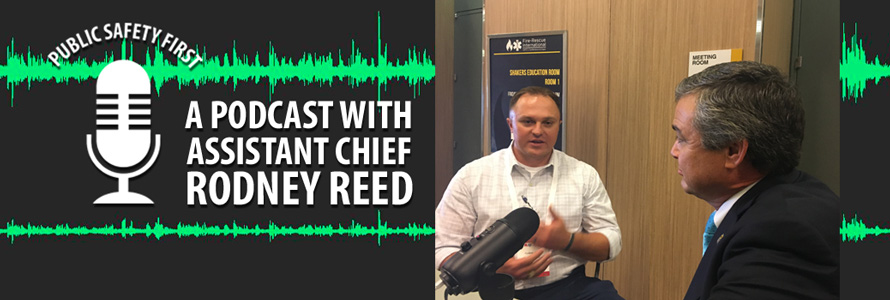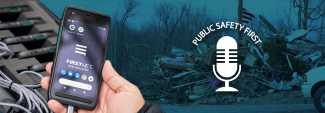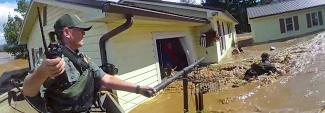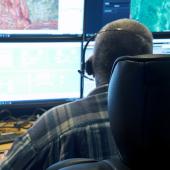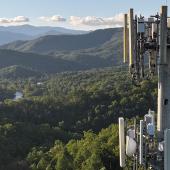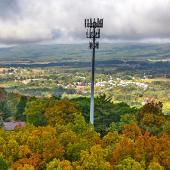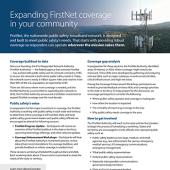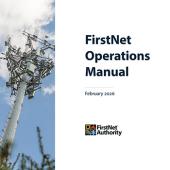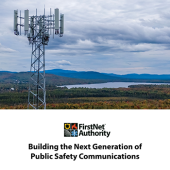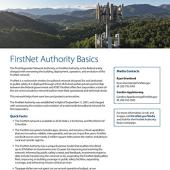Summary
Assistant Chief Rodney Reed of the Harris County Fire Marshal’s Office (TX) touches on the County’s experience as an Early Builder, and now as a FirstNet subscriber, as well as Hurricane Harvey response, apps, and Real-Time Data
Guest
Mike Worrell
FirstNet Authority, Director of the Western Region
Assistant Chief Rodney Reed
Harris County Fire Marshal’s Office, Texas
Transcript
Preview
Narrator: You're listening to Public Safety First, a podcast to help you learn about the First Responder Network Authority and how you can be part of the future of public safety technology. And now your host, Dave Buchanan.
Narrator: You're listening to Public Safety First, a podcast to help you learn about the First Responder Network Authority and how you can be part of the future of public safety technology. And now your host, Dave Buchanan.
Dave Buchannan: Welcome to the Public Safety First podcast. In this episode we hear from Mike Worrell, Western Director for the First Responder Network Authority. Before we hired Mike three years ago at FirstNet. Mike's served for 29 years with the Phoenix Fire Department, his last position being the Technical Services Division Chief. Mike interviews Assistant Chief Rodney Reed, the Harris County Fire Marshal's Office. With over 13 years in the fire services community, Assistant Chief Reed is responsible for running the operational support component for the Harris County Fire Marshal's Office. In addition, Assistant Chief Reed serves on a variety of emergency services committees including the Texas DPS Statewide Interoperability Training Working Group and Harris County Radio Special Interest Group. Mike and Assistant Chief Reed talk about Harris County's experience as an early builder. They discuss how the new generation of firefighters is taking advantage of database technologies to enhance response capabilities, the importance of bringing stakeholders together early on to understand how technology can improve information sharing across disciplines, and how FirstNet will streamline data sharing, so the public safety leaders can make informed decisions. Mike and Assistant Chief Reed had this conversation at the IAFC Fire-Rescue International Conference in Dallas, Texas.
Mike Worrell: Hey, I'm Mike Worrell I'm at Fire Rescue International 2018 Dallas, Texas. We're here with Chief Rodney Reed we're going to talk a little bit about his experience with FirstNet. Rodney, tell me a little bit about yourself.
Rodney Reed: So, Rodney Reed, I work for the Harris County Fire Marshal's Office which is in Harris County, Texas. I've been with them for six years. Prior to that I was a captain in 101st Airborne Division with deployments over to Afghanistan, and then before that I was a volunteer firefighter, so kind of come back home to my roots.
Mike Worrell: Well, Harris County was one of the early builder projects and you've had some experience on you know using LTE and FirstNet. Can you give us some examples of how that's benefited your organization?
Rodney Reed: So I think so the applications piece of what FirstNet is going bring is actually fitting much better into the age demographics of our emerging fire, EMS, law enforcement. They're growing up learning how to operate in apps. They're putting otter boxes on their phones, so they can operate in extreme environments right, and it's just a very natural for them to be working on there, and I think that's also going to lead us to better information sharing right to ultimately achieve that common operating picture of sharing each other each entities data into that situation where the LMR gave us a thousand words the mobile application is going to give us a single picture that's worth a thousand words that's updated in more real-time than what we're doing over LMR.
Mike Worrell: Great, so you know I just listened to your presentation you know talking about the response to Hurricane Harvey and you were using some applications there and you were talking about common applications and naming standards. How important are some of those things to the success of interoperability in the future?
Rodney Reed: You know one of the critical pieces that we've found in Harris County, working with Harris County Central Technology Services, the Office of Homeland Security Emergency Management is the importance of bringing all your stakeholders very to the table very early on. Making sure fire, EMS, law enforcement has mapped Public Works, Emergency Management, are all the tables so we start to understand what the use case is for each one of the response entities trying to find applications that are shared because you know what we don't want to do is we don't – the technology allows us to communicate and share information -- what we don't want to do is allow ourselves to be siloed within the program right because well you know this ego won't allow this or there’s some sort of statute that doesn't allow me to share the information. We have to get into an environment where we have a standard in which we share information and we don't silo ourselves. Mo different than we've done in the past. so that's where AT&T and FirstNet and mobile applications are hopefully going to drive us to a better ecosystem for response, but again there's the whole development and making sure everybody has user accounts, everybody understands this, but again as we as we introduce each new generation of public safety responders into this world, they are becoming more equipped than the generation that's leaving and eventually we're going to come to point where all you have to do is give them a username and password and boom all of a sudden they're ready to go and you didn't -- you’re not teaching them anything, they're teaching us now how to use technologies that we adopted.
Mike Worrell: Do you find that that generation has a higher expectation of the information that's available to make decision making you know when they show up on an incident?
Rodney Reed: I think, absolutely. You know we used to in from my experience in the military, right? We learned that we would communicate information or the radio and then we’d go overseas and now we're using various GPS tracking capabilities, we're flying ISR overhead or drones or UAS’s, right? All those things that have kind of become the standard in the military are now becoming the standard in public safety, right? We're launching UAS’ much more on our incidences, so now we have this amazing amount of data. Well now I need to share that data so how am I going to share it, right? Well, that's where AT&T and FirstNet are going to allow us to start moving that data because again, you know, we always say that that lawyers advise, and leaders decide right? And what we want to make sure is that our leaders have the most amount of information to make some of those tough decisions and in an environment where we can truly share applicable relative accurate information we should be doing that, and our first responders should be able to absorb and make those critical decisions.
Mike Worrell: That is really important because when they're sitting in the front seat there and they show up on something they have to have that actionable information, accurate actionable information.
Rodney Reed: Absolutely, and you know one of the biggest problems that we face in public safety is the expectations of the residents and the citizens that were called to respond to. In the days of social media now their ability to share information very fast right? So the problem is that creates an environment where public safety is continuing to be asked to stretch to arrive as fast as we possibly can to incidents, make those critical decisions and decrease the amount of time that we're in emergency response phase and so we can get into recovery. So again, anyway we can streamline those decision-making processes accurately is going to be critical.
Mike Worrell: Have you experienced any situations where you guys have had to you knew you and you're probably using priority and preemption on the network?
Rodney Reed: Oh absolutely. You know you know we have some being one of the early adopters and kind of the build-out and the way that Harris County has really kind of stayed at the forefront of the development and understanding is making sure that making sure that when we have our large incidents, Super Bowl, for example you start packing all these people the rodeo, absolutely, there comes that time where in previous worlds we’d look down at our cell phones and go “we're out” right now we're looking at our mobile devices saying “oh hey we're still in the game, all right let's keep moving.” So, it's really exciting and we in Harris County are going to be working with AT&T and FirstNet at the end of this year and really putting priority and preemption to the test and improving to our public safety responders that that the solution is here, the solution is viable and it's going to help protect first responders and residents and citizens lives.
Mike Worrell: Well said, I can't say any better than that. I thank you for your time and appreciate you doing this podcast.
Rodney Reed: Absolutely!
Narrator: Thanks for listening today. We're excited to have you join our podcast community and make sure to subscribe on iTunes, SoundCloud, and YouTube. You can learn more about the First Responder Network Authority at FirstNet.gov and learn about FirstNet products and services at FirstNet.com.


